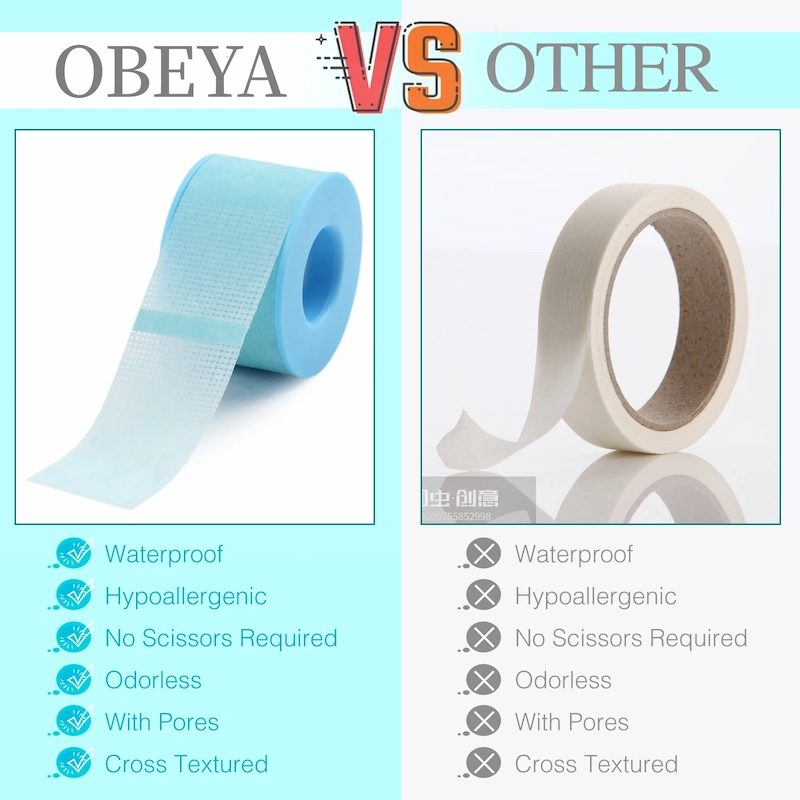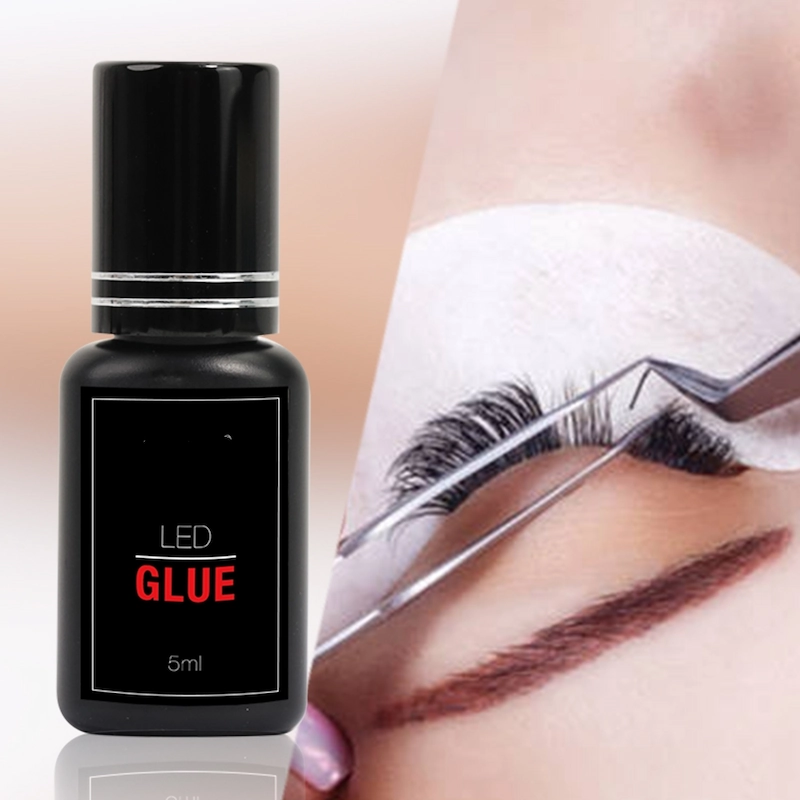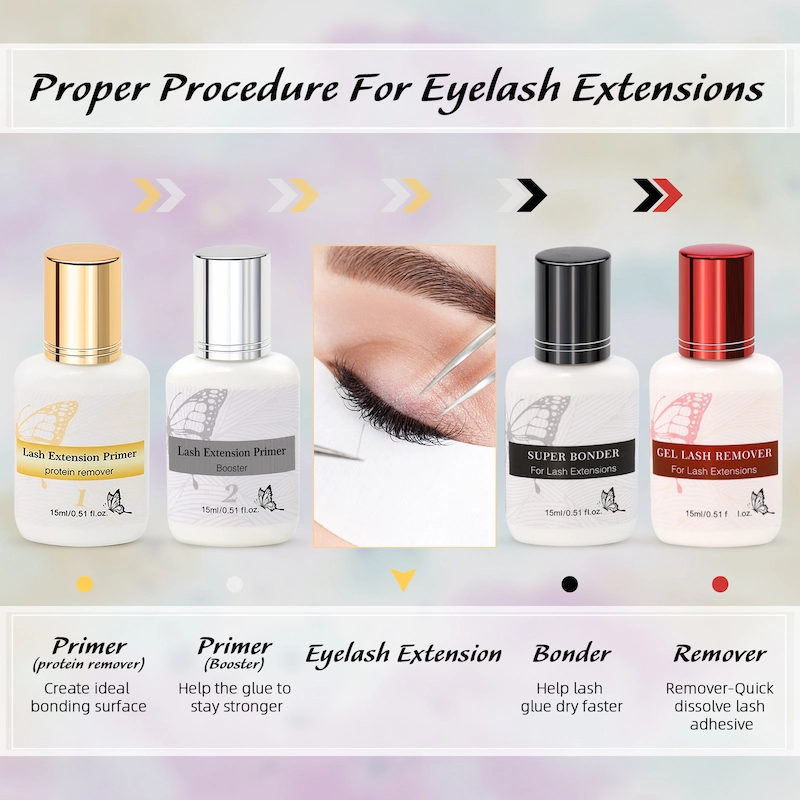eyelash extensionslifespan of eyelash extensionseyelash extension glue bondhow to make eyelash extensions lash longer
The lifespan of lash extensions depends on various factors, including the type of extensions, the adhesive used, and individual factors like your natural lash growth cycle and how well you take care of them. In general, lash extensions can last anywhere from two to six weeks.
Here's a breakdown:
Natural Lash Growth Cycle: The natural lash growth cycle, also known as the eyelash growth cycle, consists of three main phases: anagen, catagen, and telogen. Understanding these phases is essential in the context of eyelash extensions or any considerations related to the natural growth and shedding of eyelashes.
Anagen (Active Growth Phase): This is the active growth phase where new lashes are continuously being formed. The duration of the anagen phase varies for each individual but generally lasts between 30 to 45 days. During this time, the cells at the base of the hair follicle rapidly divide, creating new lash cells that add to the length of the lash.
Catagen (Transition Phase): The catagen phase is a transitional period that signals the end of the active growth phase. It is a relatively short phase, lasting about two to three weeks. During catagen, the lash stops growing, and the hair follicle shrinks. This phase prepares the lash for the next phase.
Telogen (Resting or Shedding Phase): The telogen phase is the resting phase where the lash is fully grown but not actively growing. This phase lasts for around 100 days, during which the lash remains in place until it eventually falls out. It's a natural part of the growth cycle, and new lashes begin to grow as the old ones shed. On average, people shed between one and five natural lashes each day.

Type of Extensions: There are various types of eyelash extensions, and they can be broadly categorized based on the material used to create them. The two main types are synthetic lashes and natural lashes (made from animal fur or human hair). Here's a breakdown of each type:
Synthetic Lashes:
Materials: These lashes are made from man-made materials such as polyester, acrylic, or PBT (polybutylene terephthalate). They are designed to mimic the look and feel of natural lashes.
Characteristics: Synthetic lashes are durable, hold their shape well, and are often more affordable than natural lashes. They come in a variety of lengths, curls, and thicknesses.
Mink Lashes:
Materials: Mink lashes are made from the fur of the mink, a small mammal. The fur used in eyelash extensions is usually collected during the mink's shedding season.
Characteristics: Mink lashes are known for their natural appearance, lightweight feel, and soft texture. They can provide a more natural look compared to synthetic lashes.
Silk Lashes:
Materials: Silk lashes are made from synthetic silk fibers. They are designed to be lightweight and have a glossy appearance.
Characteristics: Silk lashes are softer than synthetic lashes and can provide a natural look. They are a good option for those with allergies to animal fur.
Faux Mink Lashes:
Materials: Faux mink lashes are synthetic lashes designed to imitate the look and feel of real mink fur.
Characteristics: Faux mink lashes are lightweight, soft, and have a natural appearance. They are a cruelty-free alternative to mink lashes.
Human Hair Lashes:
Materials: Some eyelash extensions are made from sterilized human hair.
Characteristics: Human hair lashes can provide a natural look and feel. They are less common than synthetic or mink lashes.
Adhesive Used: The adhesive used in eyelash extensions is a crucial component of the application process, as it securely bonds the extensions to the natural lashes. Here are some key points about the adhesive used for eyelash extensions:
Cyanoacrylate-based Adhesives: The primary type of adhesive used for eyelash extensions is cyanoacrylate-based. Cyanoacrylate is a fast-drying, strong adhesive that forms a secure bond when it comes into contact with moisture. This type of adhesive is favored in the beauty industry for its quick setting time and reliable adhesion.
Formulations: There are different formulations of cyanoacrylate adhesives used in the lash industry, and they may vary in viscosity (thickness) and drying time. The choice of adhesive depends on the lash technician's preference and the specific needs of the client.
Drying Time: Most eyelash extension adhesives have a quick drying time, typically ranging from a few seconds to a minute. This allows the lash technician to work efficiently and ensures that the extensions adhere to the natural lashes before the adhesive fully sets.
Retention: A high-quality adhesive is essential for achieving good retention of the eyelash extensions. It should provide a strong bond that lasts through the natural lash growth cycle, allowing the extensions to stay in place until the natural lash sheds.
Low Irritation Formulas: Many modern eyelash extension adhesives are formulated to be low in fumes and irritation. This is particularly important to ensure client comfort during and after the application process.
Latex-free and Formaldehyde-free: Adhesives designed for eyelash extensions are often formulated to be latex-free and formaldehyde-free, reducing the risk of allergic reactions.

Aftercare: Proper aftercare is essential for maintaining the longevity and appearance of eyelash extensions. Here are some general guidelines for taking care of your eyelash extensions:
Avoid Getting Them Wet: For the first 24 to 48 hours after the application, it's crucial to avoid getting your eyelash extensions wet. Water can weaken the adhesive before it fully sets. This includes avoiding swimming, hot tubs, saunas, and heavy sweating.
Use Oil-Free Cleansers: When cleansing your face, use oil-free, gentle cleansers. Avoid oil-based or waterproof makeup removers, as oil can break down the adhesive and cause the extensions to fall out more quickly.
Be Gentle: Avoid rubbing or pulling at your eyelash extensions. Rubbing your eyes can cause the extensions to twist or fall out prematurely. If you need to remove makeup, do so gently with a makeup sponge or a cotton swab.
Comb Your Lashes: Use a clean, disposable mascara wand or a spoolie brush to gently comb through your lashes each morning. This helps to separate any lashes that may have become tangled and keeps them looking neat.
Avoid Oil-Based Products: Oil can break down the adhesive used for eyelash extensions. Avoid using oil-based skincare products, creams, and makeup around the eye area. Opt for oil-free alternatives.
Skip Waterproof Mascara: Avoid using waterproof mascara on your eyelash extensions, as it can be challenging to remove and may cause damage to both the extensions and your natural lashes. If you want to enhance your lashes, use a water-based mascara that is specifically designed for use with extensions.
Protect Your Lashes While Sleeping: Consider using a silk or satin pillowcase to reduce friction on your lashes while sleeping. You can also use a sleep mask to prevent your lashes from rubbing against the pillow.
Schedule Regular Fills: Eyelash extensions will naturally shed along with your natural lashes during their growth cycle. To maintain a full and consistent look, schedule regular touch-ups or fills every 2 to 4 weeks.
Notify Your Technician of Any Issues: If you experience any discomfort, redness, or unusual reactions, contact your lash technician promptly. It's essential to address any issues early to prevent potential complications.
Touch-ups and Fills: If you want to maintain a consistent lash look, you may need touch-ups or fills every 2-4 weeks. During these sessions, the lash technician will add new extensions to replace the ones that have naturally shed.
It's essential to follow the aftercare instructions provided by your lash technician and communicate any concerns or issues you may have. If you notice significant shedding or irritation, it's advisable to consult with your lash technician for guidance.
Several factors contribute to the longevity of eyelash extensions, including the quality of the products used during the application process. Here are some key considerations for products that can help eyelash extensions last longer:
High-Quality Adhesive: Invest in a premium-quality adhesive specifically designed for eyelash extensions. The adhesive should have a fast drying time, strong bonding capabilities, and be formulated to withstand the natural lash growth cycle. Your lash technician's choice of adhesive plays a significant role in the longevity of the extensions.
Quality of Lash Extensions:Choose high-quality lash extensions made from durable and lightweight materials. Synthetic lashes, mink lashes, faux mink lashes, and silk lashes are popular options. Ensure that the extensions are designed to withstand daily wear and the natural shedding cycle of your lashes.
Professional Application:
The skill and experience of your lash technician are crucial for a successful and long-lasting eyelash extension application. A professional with proper training and expertise will ensure that the extensions are applied correctly, minimizing the risk of premature shedding.
Achieving a successful and long-lasting professional application of eyelash extensions requires skill, precision, and adherence to best practices. Here's an overview of the professional application process:
Client Consultation:Begin with a thorough consultation to understand the client's preferences, expectations, and any potential allergies or sensitivities. Discuss the desired lash style, length, curl, and material.
Assessment of Natural Lashes:Evaluate the client's natural lashes, considering factors such as length, thickness, and health. This assessment helps determine the appropriate type and length of extensions to use.
Selection of Lash Extensions:Choose high-quality lash extensions based on the client's preferences and the assessment of their natural lashes. Consider factors such as material (synthetic, mink, silk), length, curl, and thickness.
Preparation of the Client:Cleanse the client's natural lashes to remove any makeup, oil, or residue. Use a gentle, oil-free cleanser to ensure a clean surface for optimal adhesion.
Isolation of Natural Lashes:Use specialized tools, such as tweezers, to isolate individual natural lashes. This ensures that each extension is applied to a single natural lash, preventing them from sticking together.
Application of Adhesive:Apply a small amount of high-quality, cyanoacrylate-based adhesive to the base of the lash extension. The adhesive should have a quick drying time and be selected based on the client's sensitivity and preferences.
Aftercare Products: Use aftercare products recommended by your lash technician. This may include a gentle, oil-free cleanser for daily cleaning, a lash-friendly mascara if desired, and a coating sealant to protect the adhesive. Avoid using products with oils, as they can break down the adhesive.
Avoid Oil-Based Makeup Removers: Opt for oil-free makeup removers when removing eye makeup. Oil-based products can compromise the adhesive bond, leading to faster shedding of the extensions.
Regular Touch-Ups:
Schedule regular touch-ups or fills with your lash technician every 2 to 4 weeks. This ensures that any extensions that have naturally shed along with your natural lashes are replaced, maintaining a full and consistent look.
Regular touch-ups or fills are a crucial aspect of maintaining the appearance and longevity of eyelash extensions. Here's why they are important and what to expect during touch-up appointments:
Natural Lash Shedding:Your natural eyelashes have a growth cycle, and they naturally shed over time. As your natural lashes shed, the attached eyelash extensions also fall out. This shedding is a normal part of the lash growth cycle.
Maintaining a Full Look:Regular touch-ups help maintain the full and consistent appearance of your eyelash extensions. By replacing the extensions that have shed with your natural lashes, your lash technician ensures that your lashes always look lush and well-defined.
Preventing Gaps:Without regular touch-ups, you may start to notice gaps or spaces in your lash line as extensions shed and new lashes grow in. Touch-ups prevent these gaps, providing a seamless and continuous lash extension look.
Adjusting the Style or Length:Touch-up appointments also give you the opportunity to adjust the style or length of your eyelash extensions. If you want a more dramatic look or decide to try a different lash style, your technician can make the necessary adjustments during the touch-up.
Assessing Lash Health:During touch-ups, your lash technician can assess the health of your natural lashes and ensure that they are in good condition. They can provide recommendations for maintaining lash health and address any concerns you may have.
Personalized Care:Touch-up appointments are personalized to your unique lash needs. Your lash technician will evaluate the condition of your lashes, discuss your preferences, and customize the touch-up to enhance the overall look.

Proper Lash Extension Removal: If you decide to remove your eyelash extensions, it's crucial to do so properly to prevent damage to your natural lashes. Seek professional assistance for safe and gentle removal.
Avoid Moisture in the Initial Hours: After the application, avoid exposure to moisture, including water, steam, or excessive sweating, for the first 24 to 48 hours. This allows the adhesive to fully set and create a secure bond.
Humidity and Temperature Control: Maintain a comfortable environment during the application process. Extreme humidity or temperature variations can affect the performance of the adhesive.
Here's why humidity and temperature control are important:
Adhesive Performance:Eyelash extension adhesives, which are typically cyanoacrylate-based, can be sensitive to environmental conditions. Extreme humidity levels or temperature variations can impact the curing process of the adhesive.
Humidity Impact:High humidity can slow down the drying time of the adhesive. If the environment is too humid, the adhesive may take longer to cure, leading to potential issues such as lashes sticking together or not bonding securely.
Temperature Impact:Temperature variations can also affect the adhesive. Extreme heat can accelerate the drying process, potentially making it challenging for the lash technician to work efficiently. On the other hand, cold temperatures may slow down the adhesive's curing time.
Comfort for the Client:Maintaining a comfortable temperature and humidity level is not only crucial for adhesive performance but also for the comfort of the client. An environment that is too hot or too cold can be uncomfortable for the client during the application process.
Consistent Results:To achieve consistent and high-quality results, lash technicians aim to create a controlled and stable environment. This helps ensure that each extension is applied with precision and that the adhesive sets properly for a secure bond.
Lash Technician Comfort:Comfort is essential for the lash technician as well. Working in an environment with comfortable temperature and humidity levels allows the technician to focus on the application process without distractions or challenges posed by extreme conditions.
Adhesive Polymerization: The cyanoacrylate adhesive undergoes a process called polymerization, where it forms a strong bond as it cures. Consistent environmental conditions support the reliable polymerization of the adhesive.
To maintain humidity and temperature control during eyelash extension applications:
Use climate control systems such as air conditioning or heating, depending on the weather conditions.
Choose a well-ventilated and comfortable workspace.
Avoid working in direct sunlight or drafty areas that can introduce variations in temperature and humidity.
Regularly monitor and adjust the environmental conditions as needed during the application.
By paying attention to these environmental factors, lash technicians can create an ideal setting for a smooth and successful eyelash extension application process.
Follow Aftercare Instructions: Adhere to the aftercare instructions provided by your lash technician. These guidelines are tailored to promote the health of your natural lashes and the longevity of the extensions.
Remember that the success of eyelash extensions is a combination of the technician's skills, the quality of the products used, and proper aftercare. Always consult with your lash technician for personalized advice and recommendations based on your unique needs.
966.webp)
Experience precision with the fine-point felt-tip applicator that goes on like e...
More >>349.webp)
Designed for beauty brands and lash entrepreneurs, our Real Mink Lash Extensions...
More >>550.webp)
With full customization for paper cards and packaging, plus options for single-l...
More >>908.webp)
Factory-direct wholesale wine red lash extensions with full private label servic...
More >>167.webp)
Professional long-wear eyelash adhesive featuring upgraded formula, fast setting...
More >>285.webp)
Designed for professional lash artists and brands, these Slanted YY Lashes combi...
More >>506.webp)
Designed for salons and distributors, these colored flat lash extensions offer s...
More >>359.webp)
Designed for efficiency and performance, our YY lash trays deliver lightweight ...
More >>